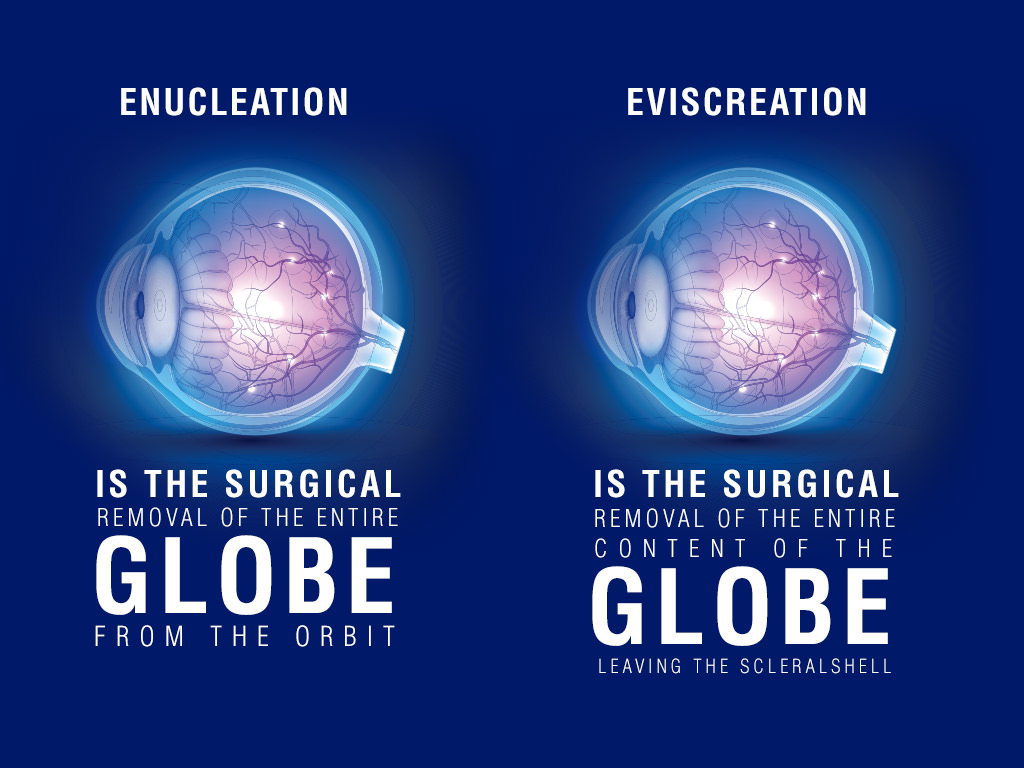What are
Enucleation
& Evisceration?


Enucleation and evisceration are two different surgical procedures that include the removal of the eye or its contents either fully or partially. Enucleation refers to the removal of the entire eye, whereas evisceration involves removing or emptying the eye contents. Evisceration surgery does not remove the white of the eye or the eye muscles.
Thank you
We’ll get back to you soon.

Common Diagnoses That Require Enucleation & Evisceration
There are several eye conditions or diseases that may require either enucleation or evisceration. The most common include:
- 1. Severe trauma or injury to the eye
- 2. Eye cancer, with the most common being eye melanoma and retinoblastoma
- 3. Eye infection that does not respond to treatment
- 4. Eye diseases in advanced or end-stage condition, such as glaucoma or diabetic retinopathy
Eye removal surgery may also be recommended if you have lost vision and experience severe pain that does not respond to treatment or that affects your quality of life.
How Can You Prevent Enucleation & Evisceration?
It may not always be possible to fully prevent the conditions or diseases that may require eye removal surgery. The best thing you can do is to take care of your eyes and protect them from injury. Also, you should maintain good hygiene standards to prevent eye infection.
Thank you
We’ll get back to you soon.
When Is Surgery Needed For
Enucleation & Evisceration?
Eye removal is always a last resort option and your eye doctor will try other alternatives before recommending this procedure. However, if all other alternatives have been tried and your eye surgeon finds that nothing can be done to save your eye (partly or wholly), they may recommend enucleation or evisceration.
Enucleation & Evisceration Surgery F.A.Q's
What happens during surgery?
Your surgeon will partially or fully remove the eye / its contents, and will fit a temporary implant or placeholder that looks like a large contact lens. This will be replaced with an artificial eye once you have recovered from surgery.
How long does enucleation and evisceration surgery last
Between 1 and 2 hours.
Will I need to be sedated?
Yes, you will be put to sleep under general anaesthesia, although in some cases local anaesthesia is enough.
Is surgical eye removal painful?
No. This surgery is done under general anaesthesia, so you will not feel anything during the procedure.
Will I need to be hospitalised?
Not unless there are complications or your surgeon recommends it, although you’ll have to spend a few hours in the recovery room to make sure you are clear of the effects of anaesthesia.
Are stitches needed?
Not usually, but in some cases, your surgeon will place a stitch on your eyelid to keep the eye closed and help recovery. This stitch is removed a few days later.
What is the recovery timeline?
The temporary implant usually needs to stay in place for a couple of months. After that, recovery is pretty fast once a custom-made artificial eye is fitted.
What are the complications?
In a small percentage of cases, inflammation, bleeding, and infection.
Will I have to use a glass eye?
Not necessarily. There are other materials used to create artificial eyes, such as acrylic.

What symptoms can I expect after surgery?
- 1. There may be some slight discomfort when you come to after surgery, but in many cases this is minimal since you may be given a local anaesthetic before the procedure is over.
- 2. You may be nauseous or have a headache for the first couple of days, which can be treated with over-the-counter painkillers.
- 3. There will be some swelling that should gradually come down. Bruising is also to be expected.
- 4. You may see some flashing lights or feel as if the removed eye is still there. These symptoms are normal and should goes away on their own over a short period of time.

Aftercare Following Enucleation & Evisceration Surgery
- 1. Follow all post-operative instructions on how to keep the eye socket clean.
- 2. You’ll be prescribed antibiotics, either as ointment or eye drops, which should be taken for 1 or 2 weeks.
- 3. Medication may also be prescribed to help you cope with nausea and discomfort.
- 4. Don’t remove the eye patch until your surgeon tells you to do so.
- 5. Keep all follow-up appointments, which are usually schedule the day after surgery, after 1 week, and after 2 months.
- 6. Talk to your healthcare provider if you’re having problems coping with the psychological effects of eye removal. Counselling can help you lead a normal life after enucleation and evisceration surgery.
